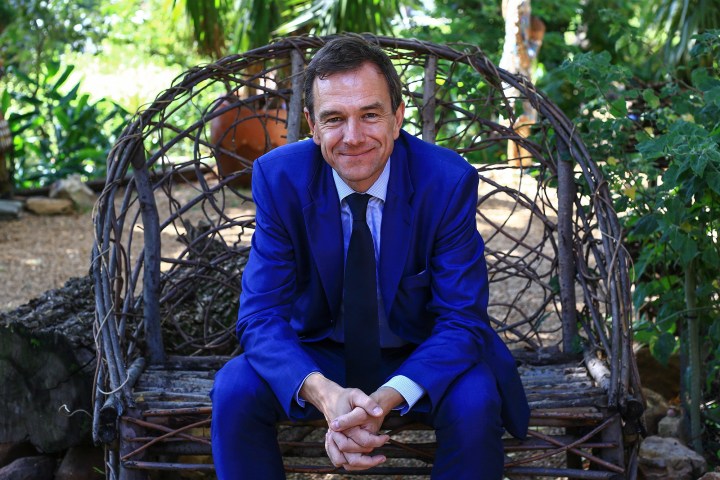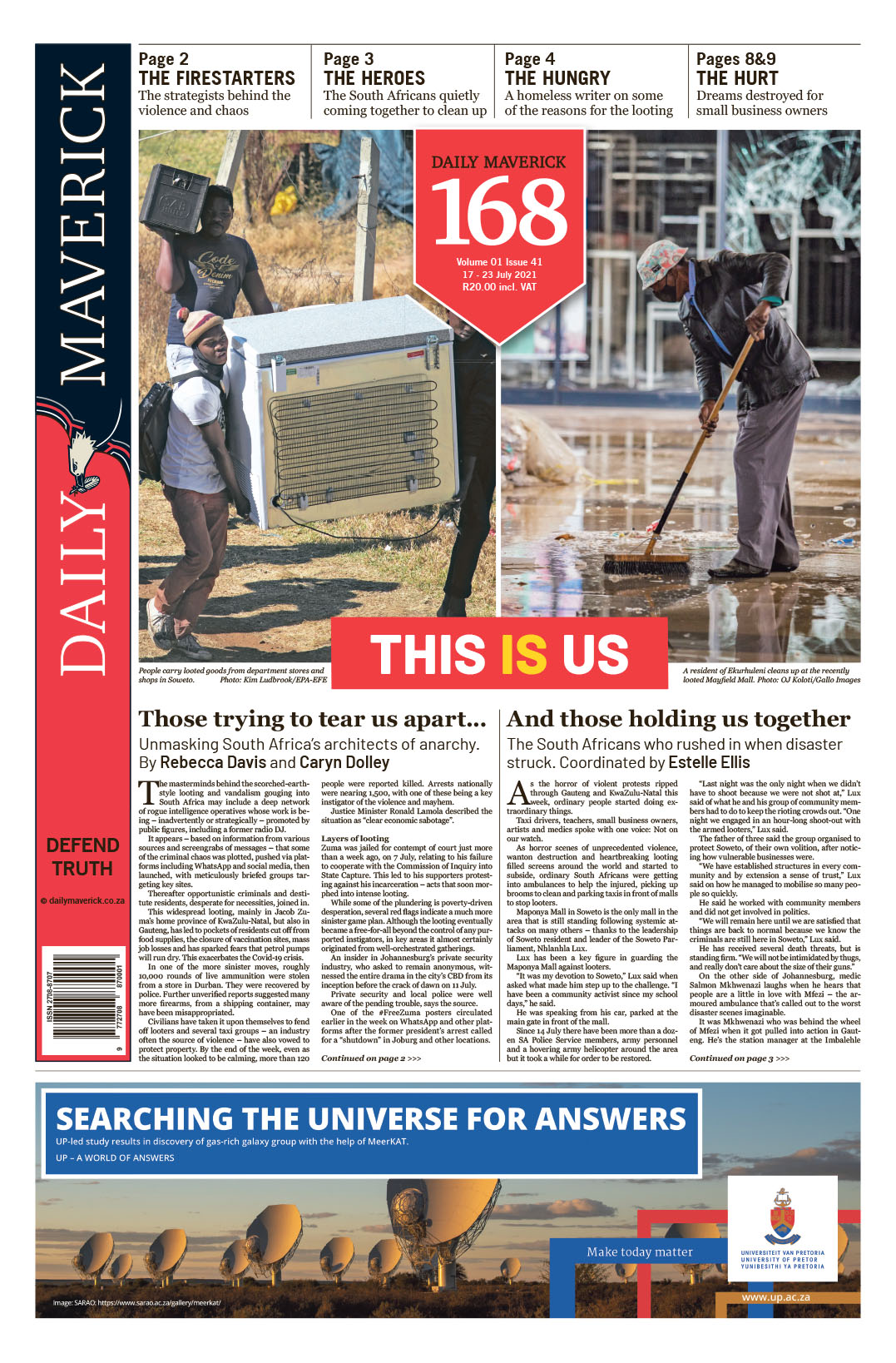DM168 DIPLOMACY
Outgoing German ambassador Martin Schäfer believes South Africa must play to its strengths

As Martin Schäfer bids farewell to SA as the German ambassador, he talks about his affinity for the country and shares insights into its challenges.
First published in the Daily Maverick 168 weekly newspaper.
When Martin Schäfer arrived in SA as Germany’s ambassador in October 2017, Cyril Ramaphosa was about to beat Nkosazana Dlamini Zuma to the ANC presidency and the Jacob Zuma administration was living on borrowed time.
On the day he left, mayhem was erupting as SA’s protracted struggle to purge itself of Zuma’s malign influence reached its climax. That, in a sense, grimly completed the circle, as Schäfer had witnessed Zuma’s rise to power during his first tour at the embassy from 2007 to 2011.
Eight years as a diplomat here has given Schäfer a deep understanding and a particular affinity and sympathy for SA, and insight into its problems.
And so the flaring up of violence, though a huge shock, was not a complete surprise. He said nine years of State Capture under Zuma “came with a huge cost in terms of almost a decade of low or no growth, a slowdown of service delivery and lack of progress in social cohesion”.
“It will inevitably take time to catch up and remedy the political, economic and social damage done until 2017. Potential investors from the international community understand that very well.
“They will weigh very carefully the political will and decisiveness in government and the ANC with which challenges to the rule of law and public order are dealt.
“It is the re-establishment and the reinvigoration of the rule of law that can and will convince investors to come in their numbers to South Africa and create jobs and employment.
“Since 2017, a lot to that effect has already been achieved,” he says. And Germany has played its part.
The transition from Zuma to Ramaphosa boosted Germany’s relationship with SA from “routine if not boredom” to “close to what it was in the first years after freedom under Mandela”, Schäfer said. President Frank-Walter Steinmeier paid the first state visit in more than 20 years in November 2018. Chancellor Angela Merkel followed in February 2020. She and Ramaphosa launched a strategic relationship. They agreed that Germany would help SA implement the German system of vocational training where young people learn their craft in a company while getting theoretical knowledge at a college.
Germany also agreed to provide SA with huge, direct financial and technical assistance if it embarked on a “bold and quick” energy transition away from its heavy dependence on coal-fired energy. Schäfer said SA emits more carbon dioxide per kilowatt-hour of electricity produced than any other country. Yet with its West Coast wind and sun, it could become a reliable exporter of renewable energy in half a generation.
Germany has a big stake in SA’s economic future, not least because of its large investments here, particularly its car manufacturers, which Schäfer says provide nearly 10% of all SA’s exports. He says Germany’s trade and investment in and with SA has become “decolonised”, as it doesn’t only extract primary resources but adds considerable value, for instance through hi-tech products like its cars, which are exported globally.
Yet Schäfer cautions that even Germany’s car manufacturers in SA – like all vehicle makers – have to become climate neutral within a generation by shifting to fuel cell or electrical propulsion.
He says that he knows from discussions with the SA state that it intends to provide the infrastructure to enable that so vehicle makers don’t move elsewhere.
“It is hard to imagine a city like Port Elizabeth [Gqeberha] without the presence of Volkswagen or East London without Mercedes-Benz,” he adds.
Is Germany worried about SA’s industrialisation policy, which includes raising import tariffs on products like clothing and textiles, poultry and sugar to protect local producers? Schäfer says that SA knows that it has to stick to the World Trade Organization’s free trade rules.
“South Africa should [rather] continue to embrace globalisation and bet on its competitive advantages,” he says. These include tourism, agriculture, global services such as call centres and certain parts of industrial production like car manufacturing.
Germany also provided help to SA in fighting the Covid-19 pandemic. For example, Volkswagen, Siemens and BMW converted disused plants into temporary hospitals. In June, Germany, France, the US and the World Bank injected €600-million into the SA company Aspen Pharmacare to boost its production, under licence, of Johnson & Johnson’s Covid-19 vaccines for SA and Africa. The project showed that the way to tackle Africa’s acute vaccine shortage was not to force pharmaceutical companies to surrender their Covid-19 vaccine patents for free. (SA, India and other countries are demanding this by calling for a waiver of the Agreement on Trade-Related Aspects of Intellectual Property Rights of the World Trade Organization.)
This would not add a single extra vaccine jab in Africa, Schäfer said. The right way would be to provide the technical know-how to the engineers and technicians to set up assembly lines. This could only be done through voluntary licensing agreements with vaccine manufacturers – not by just looking at a patent. For this reason, Germany and France were working with Aspen Pharmacare and the Biovac Institute to boost Covid-19 vaccine production.
Schäfer added that Germany was already financing a fifth of the vaccines provided to low- and middle-income countries through the global partnership Covax, and the European Union was the only vaccine-producing region in the world that had never prohibited the export of Covid vaccines or the ingredients for them. “So any criticism about vaccine apartheid is misplaced.”
The Zuma years also negatively impacted on SA’s foreign policy, Schäfer says. Nelson Mandela’s vow to advance human rights in its foreign policy showed the ANC’s own experience in successfully mobilising the world in “probably the most effective and influential political campaign of modern times” against apartheid. But after Mandela, the ANC’s stance in power slowly changed and non-interference took precedence over human rights and international values.
This accelerated under Zuma and State Capture, when the domestic deterioration of the values of the Constitution, good governance and the rule of law was also reflected in its foreign policy. So he was glad to be in SA again to see the “new dawn” of Ramaphosa transforming not only the domestic state of affairs in SA, but also its international posture, saying that “the stance of South Africa on human rights, on its own values, the values of its Constitution [has] become more and more forceful”.
Schäfer cites as an example SA’s abrupt shift of position from abstention to condemnation of Myanmar’s government for its abuse of its Rohingya Muslim minority in 2018. SA also shifted towards a more balanced posture between its Western partners and its allies in the BRICS bloc, particularly the anti-Western China and Russia, he said.
Schäfer said Germany and SA worked well together when both served as non-permanent members of the United Nations Security Council in 2019 and 2020, especially on resolutions to combat sexual violence in armed conflict and boosting the role of women in negotiating and mediating peace. SA’s BRICS allies, Russia and China, had become more assertive in defending their interests in the international community, he said.
But SA resisted their pressure more often than before and “had a clear stance also on many issues of human rights, which were controversial with Russia and with China”. SA’s stance on most of the issues “was almost identical to ours or the European ones”.
Gustavo de Carvalho, a senior researcher at the Institute for Security Studies, agrees that SA voted more often with Western states on the Security Council than with Russia and China. He noted the debate on Germany’s April 2019 resolution against sexual violence in armed conflict when the SA ambassador berated Russia and China for abstaining from the vote.
He also lists disagreements between SA and Russia especially, in votes on humanitarian access in Syria and on Somalia, Haiti, Sudan and South Sudan.
Schäfer says he personally believes that SA would be the right African candidate to take a permanent seat on the United Nations Security Council.
On some global issues, though, SA and Germany did not concur, such as the crisis in Venezuela, when SA backed the populist, socialist and autocratic Maduro government, and Germany and the West strongly opposed it. And while they agree on the need for political, economic and social change in Zimbabwe, they disagree on how to effect that change. Germany remained convinced that only SA has the position and the power to influence those changes.
Schäfer is philosophical about such disagreements, ascribing them to the different geographies and histories of SA and Germany. “South Africa is a country on the southern tip of Africa, Germany is a country in northern Europe. We are 8,000km apart.” Africa experienced colonialism and struggled for freedom and independence, Germany played a major role in two world wars.
The legacy of the Holocaust, for example, meant that Germany would always be committed to the safety and security of Israel, whereas the ANC – because of its freedom struggle – inevitably feels a lot of solidarity with the Palestinians.
Nevertheless, he notes that both Germany and SA share the belief in a two-state solution in the Middle East and oppose Israel’s policy of settlement expansion across Occupied Palestinian Territories. DM168
This story first appeared in our weekly Daily Maverick 168 newspaper which is available for free to Pick n Pay Smart Shoppers at these Pick n Pay stores until 24 July 2021. From 31 July 2021, DM168 will be available for R25 at Pick n Pay, Exclusive Books and airport bookstores.




















 Become an Insider
Become an Insider
Comments - Please login in order to comment.